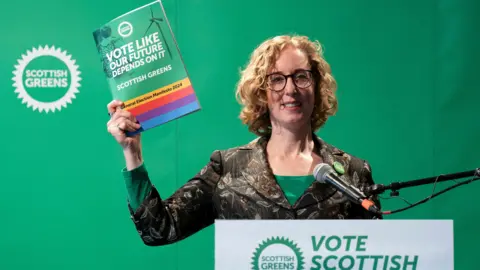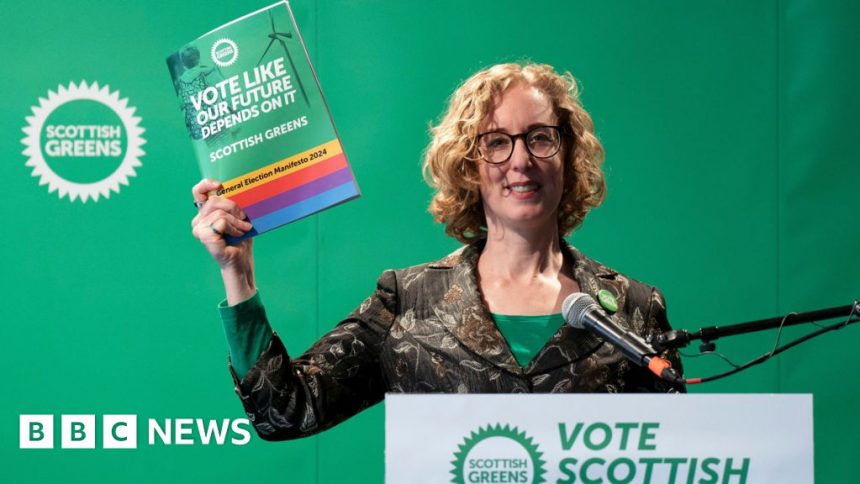Scottish Greens manifesto: Key policies analysed
 PA Media
PA Media The Scottish Greens have launched their 2024 election manifesto, in which they promise to “turbo charge” Scotland’s journey to net zero with a call to invest £28bn a year in tackling climate change.
The document sets out the party’s plans if it was to form a government.
Here are some of their key policies, analysed by BBC Scotland correspondents.
Revoke licences for oil and gas exploration
It’s probably no surprise that the Scottish Greens go the furthest of all the main parties when it comes to their position on oil and gas exploration.
Not only do they want the next UK government to end new licences, they also want to see recently issued ones revoked.
That would be a costly business because companies will have already invested millions as licence holders and so will demand compensation, probably through the courts.
The manifesto quotes the International Energy Agency which says new fossil fuel production must end now if global climate change targets are to be met.
They also want to see an end to all subsidies and tax breaks for the fossil fuels sector which would overturn very long standing agreements on how the expensive job of decommissioning the North Sea will be paid for.
The industry has contributed billions to the economy since the start of the oil boom in the 1960s and the understanding was that they’d receive these tax breaks in return for the clean up.
The party wants to see Scotland at the heart of a clean energy revolution but says expensive new nuclear power must be ruled out of the mix.
Give Holyrood the power to hold referendums
The Scottish Greens are long-time backers of independence – and their manifesto includes the call for the powers to hold constitutional referendums to be devolved to the Scottish Parliament.
Their argument mirrors that of the SNP, namely that it should be up to Scots to decide when to have another vote.
So far, calls for a second referendum have been denied, and Labour has been clear it doesn’t support one.
With backing for independence hovering around 50%, the Greens say they recognise there’s more work to do to persuade voters of their case.
And in the meantime, the party wants more devolution, including full control over taxation, and greater borrowing powers for the Scottish government. The Greens say those powers would provide the opportunity to demonstrate how things can be done differently.
They also want to remove the UK government’s veto over Holyrood legislation, after the mechanism was used by the Scottish Secretary to prevent a new system of gender recognition being enacted in Scotland.
The Scottish Greens were big supporters of that policy – and moves to block it have fuelled their argument that Holyrood has been treated with contempt.
Legal right to free healthcare
The Scottish Greens don’t pretend that they would be able to influence health policy in Scotland through the results of this UK general election. But they say their overarching goal of Scottish independence offers a route to “powers to protect our right to care from the NHS”.
They say that in an independent Scotland, the Greens would ensure a written constitution could offer the legal right to free healthcare, including hospital treatment, mental health services, dentistry and eyecare.
But past experience of legal guarantees to healthcare in Scotland have not proved enough to make it a reality.
Since 2011, the Scottish government’s treatment time guarantee has set out a legal obligation for health boards to provide inpatient and day case treatment for patients within 12 weeks of diagnosis. But in the latest quarterly statistics, only 56.7% of those patients had actually been seen within this timeframe.
The Scottish Greens might argue that in an independent nation, the government would have more levers of control to make this a possibility. But putting something down in writing does not instantly provide the funding and the staff to make it happen overnight.
Introduce a more progressive tax system
For the first time, Scottish Greens can set out what they’ve done in government as well as what they would like Westminster to do next.
It gives their manifesto a sharper edge, or perhaps it just reads that way after having seen Scottish Green ministers at work. This is no longer the politics of wishful thinking.
The party’s programme for Westminster, however, remains that of a pressure group seeking opposition seats inside the Commons, with plans that don’t have to add up. They would, however, combine to bring radical change, and unabashedly so.
This plants the party firmly on the left of politics, in case there was any doubt, with nationalisation of buses to broadband to Loganair’s island air services.
There’s intervention in the economy, to cap food prices while inflation rides high, to introduce a universal basic income, a scrappage scheme for boillers and cars while reinstating dates for ending their sale, and lowering the Bank of England lending rate for green investments.
This puts Scottish Greens close to trade unions on ideas for stronger worker rights, parental and compassionate leave, and a four-day week with no loss of pay.
On tax, the target is wealth, with a tax on those with assets worth more than £3.4m, ranging from 1% up to 10% per year, bringing in an estimated £70bn. As with the SNP, it’s proposed that UK income tax should match Scotland’s higher rates and more thresholds.
At least one Green proposal is likely to be considered by the next Westminster government, even if bigger parties won’t admit it now: a system for charging drivers per mile for use of the road, to replace fuel duty revenue as petrol and diesel is extinguished.
Decriminalise drugs
The Scottish Greens argue drugs possession should be decriminalised by the UK government and/or that the policy be devolved to Holyrood, so Scottish ministers have the power to change the law themselves.
The Greens say a change in drugs laws would ease the introduction of safe consumption rooms and drug checking services. These checking services already operate in countries including Canada and allow individuals to submit drug samples for analysis and get individual feedback.
The aim is to reduce the harm of street drugs which have increasingly unknown strengths, but in the UK the services require licences issued by the Home Office.
The Greens suggest the current legal framework acts as a barrier. Drugs policy is currently reserved to Westminster. Health is devolved though and some would argue there are improvements in healthcare which the Scottish government could make within its existing powers.
Devolve broadcasting to Holyrood
The Scottish Greens – like the SNP – want to devolve broadcasting to the Scottish parliament.
But they would go further, establishing a Scottish media authority and legislation which would monitor social media as well as mainstream output.
That monitoring would extend to hate speech, with the potential to ban advertising which “promotes hate speech or undermines democracy.”
They support the continuation of the licence fee in funding the BBC, but believe it needs to be reviewed in a fast-changing media landscape.
They want to see the expansion of the Local Democracy Reporting scheme, which is operated by the BBC, to support local newspapers and give more space to community voices.
They’d also like to introduce a levy on paid streaming services – with incentives for those who invest in content production in Scotland.
They also want to ensure that nationally important events like football and the Eurovision Song Contest are available on free to air services.







